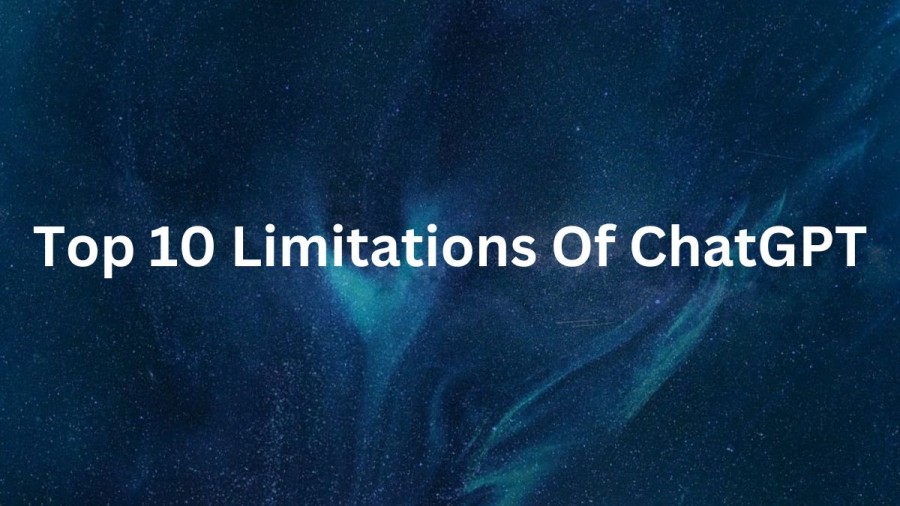What is ChatGPT?
ChatGPT is an AI language model developed by OpenAI that uses deep learning to process and generate human-like responses to user input. It is built on OpenAI’s GPT-3 family of large language models and has been fine-tuned using various techniques to improve its language processing capabilities.
As a language model, ChatGPT can perform a wide range of language processing tasks, including natural language understanding, text completion, translation, and conversation. It has been integrated into various applications and platforms to improve its language processing capabilities.
While ChatGPT is known for its articulate and detailed responses, its objective accuracy can sometimes be inconsistent, which is a known limitation of language models. However, ChatGPT represents a significant advance in the field of AI language processing and has generated considerable interest and attention from researchers, developers, and the general public.
Top 10 ChatGPT Limitations
ChatGPT is an artificial intelligence language model with a wide range of capabilities, including language translation, song composition, answering research questions, and even computer code generation. It has become a popular tool for various applications, including chatbots and content creation, thanks to its impressive capabilities.
However, ChatGPT is not without limitations. As with any AI technology, it faces challenges and weaknesses that can impact its performance and accuracy. For example, ChatGPT has difficulty understanding complex contexts and its responses can sometimes be based on biased data.
By recognizing the limitations of ChatGPT, we can better understand the potential issues and challenges that arise when using AI language models in various contexts.
Top 10 ChatGPT List Limitations
Lack of emotional intelligence
ChatGPT, despite being able to generate human-like responses and having access to a large amount of information, lacks human-level common sense and background knowledge. Consequently, there may be cases where ChatGPT provides meaningless or inaccurate responses to specific queries or situations. ChatGPT is capable of producing responses that seem empathetic. However, he lacks genuine emotional intelligence, meaning he is unable to identify subtle emotional cues or respond appropriately to complex emotional situations.
Limitations of contextual understanding
ChatGPT may experience difficulty understanding the context of a conversation, especially when sarcasm or humor is involved. Although ChatGPT is adept at processing language, it may have difficulty discerning the subtle nuances of human communication. If a user uses sarcasm or humor in their message, ChatGPT may not capture the intended meaning and instead generate an inappropriate or irrelevant response.
Difficulty producing longer pieces of structured content.
Although ChatGPT is capable of generating grammatically correct and coherent sentences, it faces difficulties in producing long structured content that follows a specific format, narrative or structure. Therefore, ChatGPT is currently best suited for generating short content, such as bullet points, summaries, or concise explanations.
Difficulty multitasking.
ChatGPT works most effectively when you are given a singular task or goal to focus on. When assigned multiple targets simultaneously, ChatGPT may encounter difficulty prioritizing them, ultimately leading to decreased accuracy and efficiency.
biased responses
ChatGPT training involves a large amount of text data, which may contain biases or prejudices. Consequently, the model may produce responses that unintentionally exhibit biased or discriminatory behavior.
Limited knowledge
Despite having access to a large amount of information, ChatGPT cannot match the breadth and depth of knowledge that humans possess. As a result, you may have difficulty answering questions related to very specific or specialized topics, and you may also lack knowledge of recent developments or changes in certain fields.
Limitations in handling typographical, grammatical and spelling errors.
ChatGPT’s ability to detect and correct typographical, grammatical and spelling errors is limited. Additionally, the answers it generates may be objectively correct, but may lack precision or relevance, especially when complex or specialized information is involved. Therefore, it is essential to collate and validate the information provided by ChatGPT.
Need for adjustment
To achieve optimal results for specific use cases, fine tuning of ChatGPT may be necessary. This process involves training the model with a particular data set to improve its performance and accuracy for a specific task or objective. However, adjustment can be a time-consuming and resource-intensive process.
Cost and resource requirements for ChatGPT
Due to its high complexity, ChatGPT requires significant computational resources to function effectively. This can lead to high operating costs and the need for specialized hardware and software systems. Running ChatGPT on low-end hardware or systems with limited computing power can lead to slow processing times, lower accuracy, and other performance issues. Therefore, organizations should carefully evaluate their computing capabilities and resources before using ChatGPT.
Developing quickly
OpenAI is working on a new version of ChatGPT, which will be released later this year. To stay up to date on the latest developments in business and technology, be sure to subscribe to my newsletter and follow me on Twitter, LinkedIn, and YouTube. You can also check out my books “Future Skills: The 20 Skills and Competencies Everyone Needs to Succeed in a Digital World” and “Business Trends in Practice,” which received the 2022 Business Book of the Year award.
ChatGPT Limitations Overview
ChatGPT has several limitations, as recognized by OpenAI. One of them is the tendency to generate answers that sound plausible but are incorrect or nonsensical, a phenomenon known as AI hallucination, which is common to large language models. Additionally, ChatGPT’s reward model, designed around human oversight, can sometimes lead to over-optimization, which can hinder performance, a concept known as Goodhart’s law.
Additionally, ChatGPT cannot express political opinions or engage in political activism, according to the BBC. However, research suggests that when asked to take a stance on political statements, ChatGPT displays a left-libertarian and pro-environmental orientation.
Disclaimer: The above information is for general informational purposes only. All information on the Site is provided in good faith; However, we make no representations or warranties of any kind, express or implied, regarding the accuracy, adequacy, validity, reliability, availability or completeness of any information on the Site.
Categories: Top 10 News
Source: Hello Kitty Kindergarten
